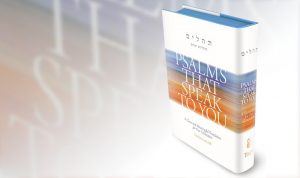Make Tehillim Sing!

“This new translation of Tehillim will change your life!” My friend in Johannesburg was exultant. I reacted with the enthusiasm of one who contemplated spending an hour looking over a list of new offerings on the Mongolian Stock Exchange. In Mongolian. Why would I care about a new translation? All the competent translations I’d seen struck me as about the same. The difference usually was the page format. Some offered facing-page translation, others some variety of interlinear presentation.
My friend insisted that I take a deeper look. I did – and I got it. He was right. Rabbi Yitzchok Leib Bell’s Psalms That Speak To You works like no other that I have seen. It is a translation that captures not just the meaning of the words, but the heart that went into their authorship. It is a translation for those who want to daven Tehillim, not to read or study it.
Translators have to make tough choices. If they choose absolute fidelity to every word, the result is choppy and clumsy. If they get too colloquial, they have crossed a line into paraphrase. In the Torah world, we have far too much yiras ha-rommemus for kisvei kodesh to go for the latter. But the former often leaves people doing a second round of translation in their own minds: “Now how would I say that in my own words?” That presents no problem if you are studying the text. But it is unwieldy if you are trying to pour your emotions into a conversation with HKBH, using Tehillim as the best vehicle ever known to Man to do so. You wind up more brain-squeezed than heart-felt.
What we needed was a translation that is scrupulously faithful to the spirit and content of our mesorah, but whose words preserve the cadence, the feeling of the original, and which express the profound yearnings of the soul in words that we would use ourselves. Psalms That Speak To You does all that. It makes Tehillim sing!
Rabbi Bell possesses the literary instincts of a good translator. The words he chooses flow smoothly and effortlessly. Skeptics that we are, thought, why would we trust him? We won’t accept a pleasant-sounding product if it is not faithful to the original. Rabbi Bell assures us that every choice he made between competing understandings of a word or phrase is backed up by a traditional commentary well within our mesorah. I’m inclined to accept his word. He is a punctilious talmid chacham, and he delivered in every instance that I challenged him.[1]
Here are a few examples of the difference between the Artscroll translation (AS) that has served us well till now, and R. Bell’s (PTSTY), taken from well-used passages:
|
Text |
AS |
PTSTY |
|
145:3 |
Hashem is great and exceedingly lauded, and His greatness is beyond investigation |
G-d is great and beyond praise; we cannot estimate His greatness |
|
13:3 |
How long must I set schemes within myself, is my heart melancholy even by day… |
How long must I make plans for my aid, and each day my heart be filled with grief… |
|
19:2-3 |
The heavens declare the glory of G-d, and the firmament tells of His handiwork. Day following day utters speech, and night following night declares knowledge. |
The heavens proclaim the glory of G-d and the skies declare the work of His hands. Each day arouses praise of G-d, and each night conveys knowledge. |
|
22:2 |
My G-d, my G-d, why have You forsaken me; why so far from saving me, from the words of my roar? |
My G-d, my G-d, why have You forsaken me? Why do You remain far from my salvation and my cries of distress? |
|
130:4-5 |
For with You is forgiveness, that You may be feared. I put confidence in Hashem, my soul put confidence, and I hoped for His word. |
Forgiveness is Yours alone, so that we fear only You. I put my hope in G-d; my soul has hope. I wait for His word. |
|
142:3-4 |
I pour out my plaint before Him, my distress I declare before Him. When my spirit faints within me – for You know my [perilous] path; on this road that I wal they have laid a snare for me. |
I pour out my speech to Him and tell Him of my troubles. When my spirit collapses, You know the difficulties I face. Wherever I go, they have hidden traps for me. |
Psalms That Speak To You is distributed by Feldheim, and available in hard-bound and compact paper-bound formats.
-
I did chide him for not providing a list of his authorities. I urged him to make them available through a website. If enough users think similarly, I think he will do it. ↑



It might not surprise anyone that my library does not contain any Artscroll volumes. It might surprise people that I regularly recite/study Tehillim on behalf of both cholim and those departed.
I try to study as I read and I have found three translations into English, while different, very worthwhile. One is Daat Mikre’s 3 volume work with a haskamah from RAL ztl. A second is a translation by Rabbi Eli Cashdan with brief commentary by Rabbi Dr. Weinreb published by Koren. A third is by Prof. Robert Alter and may not be acceptable to many on this site.
As is known, the trop provides a syntax that can be inconsistent with a particular translation and consistent with another. Trop on Tehillim (as well as Iyov and Mishlei) is different from the rest of Tanach, and at least for me, it is very challenging at times to guess at possible consistent interpretations.
When one recites and studies Tehillim, prayer comes easily.
This reminds me a lot of what I perceive Rabbi Aryeh Kaplan’s translation of the Torah (the Living Torah) to be: completely faithful and accurate to the actual Hebrew words, yet using simple, everyday language when translated into English. It is why I have long used it as my most basic, fundamental Torah book that appears in English.
As for the Tehillim, I have heard that there is a very religious Jewish woman living right here in Los Angeles who recites (and I assume has memorized) the entire Tehillim in its entirety, every single day. Such a lofty goal is way out of my league, but what I have long fantasized about in this realm, is to choose, say, the 25 most important Tehillim that are not too long, and to memorize those. One problem with that, of course, is figuring out which ones to include on such a list. Clearly #23 (Mizmor L’David….) is probably the most indispensable and famous one of them all, plus of course #145 (Ashrei…) is abundantly familiar to all of us, as it is so central to our davening.
The Artscroll version sounds more poetic to me.
“That presents no problem if you are studying the text. But it is unwieldy if you are trying to pour your emotions into a conversation with HKBH…”
This reminds me of a conversation I had with a mechanech who is a descendent of RSRH. He was visiting my family, and noticed Rabbi Eliyahu Meir Klugman’s biography of Rav Hirsch (Artscroll) on the living room bookshelf. He asked me if I found it easy to read, and I asked him in turn why he would think otherwise.
He told me that there was originally a question whether the endnotes that the book has (I think partially based on Prof. Breuer’s research) would take away from the reading experience. I later thought of the same comparison between the intellectual and emotional Tehilim experiences(in some contemporary secular books I’ve read, the style is to include the text without endnotes for easy reading, and then to also reference the page and some of the paragraph on each endnote).
One should learn Tehilim even with just Rashi and Metzudos just to realize that the entire sefer expresses so many of Dovid HaMelech’s inner moods. It is as if Dovid HaMelech is on the Divine Couch when he is expressing himself. When you learn Tehillim on any level or on a high level as Dr Bill stresses, what you say has a lot more kavana and meaning
Speaking of the trop for Tehillim—who today knows how to chant to it?
There are recordings on the internet of Chazan Yosef Hamoui zt”l (Aleppo Syrian) reading the whole Tehillim and more with trop. Look him up.
You can get them through Rennanot on a few CDs. It’s wonderful for acquiring fluency